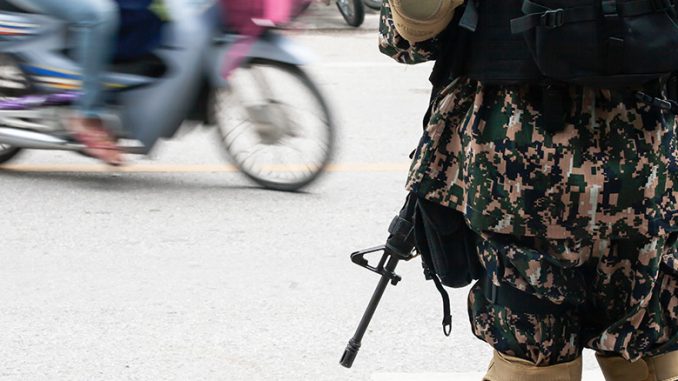
Since 2004, the Thai government has implemented security laws in regards to Thailand’s Deep South. These comprised of Martial Law, the 1914 The Emergency Decree on Public Administration in Emergency Situations, 2005, and the Internal Security Act of 2008. According to the promulgators of these stringent laws, they were needed to maintain public safety and solve or settle the insurgency. Initially as a political solution, the Thai government implemented a “politics leading the military” approach in the hope to resolve the problem; this had previously succeeded in neutralising Thailand’s communist insurgency which ended in the early 1980s (International Crisis Groups, 2009). In the Deep South of Thailand however, it was “the military leading politics” approach that came about, referring to political conditions under the military. Under security laws, the Deep South of Thailand was placed under the control of security forces, either under the rule of civilians or a military junta government.
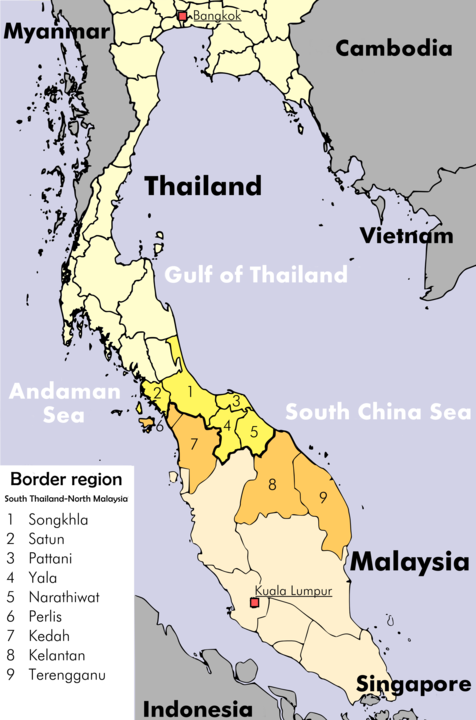
Security laws granted extrajudicial use of power to security forces to search, arrest and detain suspects for investigation, events often carried out in undisclosed locations with denial of medical and legal aid or access to contact family members and lawyers (Najish, 2017). In addition, these laws have also restricted and violated freedoms, rights, and the liberties of civilians in conflict areas. Under security laws, protection against right abuse disappeared (Seiff, 2016). Furthermore, the majority of those affected by the enforcement of security laws are Malay Muslims. In comparison, there have been no reports of Thai Buddhists being affected in the same way in terms of human rights violations and injustices committed by security forces in the Deep South of Thailand (MAC, SPAN, HAP, Duay Jai, & JASAD, 2019).
The impact on civilians in terms of the human rights violations issue
This section discusses the impact of security laws on civilians in the conflict areas covering three aspects; (I) the impact on children; (II) the impact of torture and ill-treatment on civilians; and (III) the impact of extrajudicial killings on civilians.
The impact on children
The enforcement of security laws has not only affected adults but also children and there was no special measures in regard to the search, arrest, detain, the conduct inquiries and release of minors (Duay Jai, 2019). According to the report by Hearty Support Group (Duay Jai) and Pattani Human Rights Organisation (HAP), children have also been affected by the enforcement of security laws, particularly the Martial Law and Emergency Decree 2005. Security forces can arrest, detain, prosecute, and force children to give their DNA without any protection measures as set by the Convention on the Rights of the Child and the Child Protection Act. According to Article 3 of the Convention on the Rights of the Child (1989), all actions concerning children, whether undertaken by public or private social welfare institutions, courts of law, administrative authorities or legislative bodies, the best interests of the child shall be a primary consideration.
However, under security laws, most of the Convention on the Rights of Child as outlined above is ignored. This might lead to psychological trauma manifested as nightmares, chronic paranoia, and refusal to go to school or leave their mother (Pechdau, 2014). Looking at the records for the years 2007-2018, there were a total of 86 detained children, 9 prosecution cases against children, and 8 collected DNA samples as shown in Figure 1.
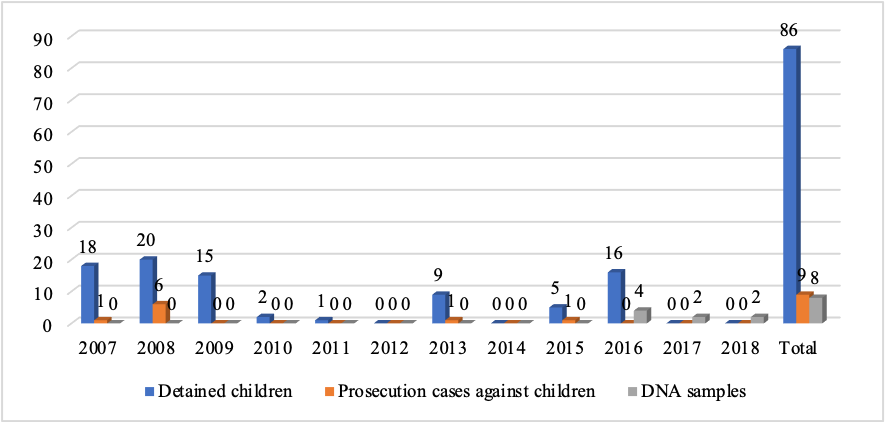
The impact of torture and ill-treatment on civilians
International law prohibits torture and other cruel, inhuman or degrading treatment or punishment. According to Article 4 and 7 of the International Covenant on Civil and Political Rights (ICCPR) (1966), no one shall be subjected to torture and other ill-treatment. It cannot be infringed or restricted even in times of emergency which threaten the state. However, in the Deep South of Thailand, torture and ill-treatment have become part of the system due to the provisions of the Martial Law and the Emergency Decree 2005.
These security laws grant special authority to security forces to obtain information from suspects, to extract confessions, to compensate for poor intelligence and evidence-gathering, to intimidate a suspect into withholding or withdrawing perceived support for the insurgency or to punish them (Amnesty International, 2009). These methods are in the form of torture and ill-treatment as shown in Infographic 1.
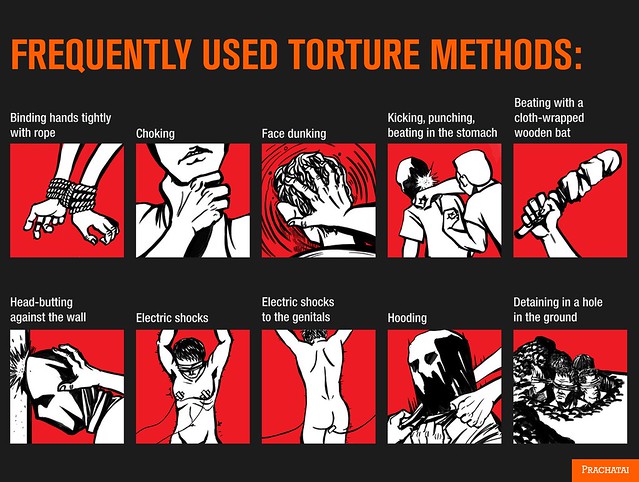
During detention, torture and ill-treatment is often used in the hope of extracting confessions from the detainees during the first week of detention when a fundamental safeguard is not fully respected (MAC et al., 2019; Seiff, 2016). In some cases, security forces used the benefit of the authority provided by the security laws to obtain information from detainees and at the same time take revenge on them through torture when their family members may have been killed by the insurgent groups (MAC & SPAN, 2019). Even when Thailand became a state party of the Convention against Torture (CAT) on October 2, 2007, it did not change the occurrence of human rights violation incidents on the ground. Security forces still used torture and other forms of violence against those who were identified as enemies of internal security. Figure 2 indicates victims of torture and ill-treatment affected by security laws between 2007-2018.

The impact of extrajudicial killings on civilians
Another incident of human rights violations caused by the law enforcement officials found in the Deep South of Thailand is extrajudicial killing. This is the killing of a person by law enforcement officials outside judicial proceeding or legal process (Aziz, 2015). In the context of the Deep South of Thailand, extrajudicial killings are carried out by security forces and used of in operations against suspects or members of insurgent groups. Sometimes extrajudicial killings are done in secret before arrest or investigation. This act violates basic human rights. According to the International Covenant on Civil and Political Rights (ICCPR) (1966) Section 3, Article 6, every human being has the inherent right to life. This right shall be protected by law. No one shall be arbitrarily deprived of his life. Between 2007-2018 there were a total of 216 extrajudicial killings in the Deep South of Thailand as shown in Figure 3.

The rights and liberties of civilians to gain access to justice
The security laws have not only affected in terms of human rights violations but also the rights and liberties of civilians to gain access to justice. The limitation of rights and liberties of victims to gain access to justice, particularly the judicial process under security laws, can be divided into four issues as follows.
Visitation
Relatives and lawyers were not allowed to visit detainees during the first three days of detention. But this rule was changed and later only relatives were allowed. Sometimes visits were allowed but just for five minutes and not exceeding 30 minutes; the security forces present at all times thus making it impossible to talk about the situation openly and fully. However, most requests to visit were denied (MAC & SPAN, 2019).
Detention
Security forces were able to detain suspects for a period not exceeding seven days, with an option to extend the detention for a term of not more than 30 days. In fact, security forces often seek to detain suspects up to 37 days before seeking the permission of the court and sometimes even without seeking the permission of the court as a result of the overlapping enforcement of laws between Martial Law and Emergency Decree 2005 (MAC & JASAD, 2019).
During detention for interrogation, the guarantee for fundamental legal safeguards was weaker than in the criminal code. Security forces were able to repeatedly question or not question detainees, yet they were still held for the prescribed 30 days even if not questioned. At this time, detainees would not have to be charged with a criminal offense in order to validate their detention. In spite of the fact that the person arrested and detained was only a suspect and not one who has been accused of committing a crime under a criminal procedure, the rights of these individuals remained limited in comparison to an accused in other criminal cases (CrCF, Duay Jai, & HAP, 2016). In addition, relatives or a lawyers were unable to meet detainees as the detention facility was concealed and security forces subsequently relocated the individual to a facilities to prevent further access from relatives and lawyers for independent counsel (MAC & SPAN, 2019).
Bail
In order to bail suspects or detainees, the relatives of victims had to pay 70 percent of the collateral and 30 percent in cash per-case. It is almost impossible to seek provisional release from the law courts for security offences as many of the detainees were lacking funds (Duay Jai, 2018).
Inability in acquiring lawyers during the interrogation process
The suspects and victims were unable to have a chance to exercise their rights to have or see lawyers after their arrests and detention. During detention, they were interrogated without the presence of any lawyers in the rooms. This made the suspects and victims unaware of his or her rights and the lack of knowledge in the legal system hindered their access to justice (Duay Jai & HAP, 2017).
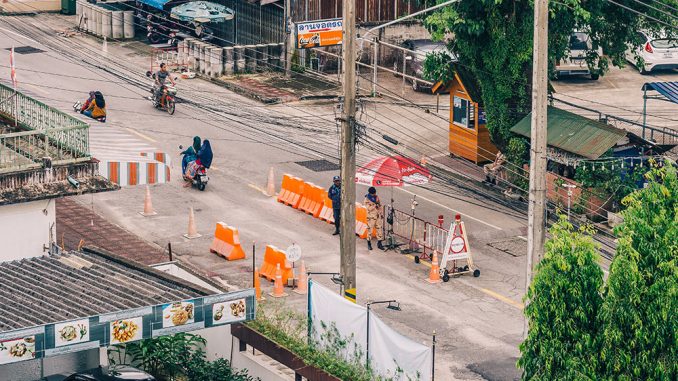
Conclusion
Supposedly, the Thai government implemented the security laws for state security. Yet for those in the Deep South, it seems that security forces were more of a threat to local people than other actors. Security forces are should be there to maintain public safety, and yet statistics of victims of torture, ill-treatment, and extrajudicial killings committed by security forces under the enforcement of security laws between 2007 and 2018 show that the enforcement of security laws is the main cause of human rights violations in the Thailand’s Deep South. More than 500 local people have been victims of human rights violations committed by security forces under the security laws. As Haberkorn (2015); Najish (2017); Seiff (2016) have argued in their studies, the enforcement of security laws such as Martial Law 1914, the Emergency Decree 2005, and Internal Security Act of 2008 are the main causes of human rights violations of civilians in Thailand’s Deep South.
Owing to these laws, the incidents of torture, ill-treatment, and extrajudicial killings committed by the law enforcement security forces is still a growing phenomenon in the Deep South of Thailand. Although the Internal Security Operations Command Region 4 (ISOC) states that there is no policy to condone torture, ill-treatment as well as extrajudicial killings in conflict areas, these abuses remain widespread (Amnesty International, 2009). Furthermore, both the civilian government and the military junta government have pledged to work on justice as a way to achieve peace in the Deep South of Thailand. However, such promises have not been realised.
Although statistics show a decreasing number of victims affected by human rights violations in some years, it does not mean that the Thai government practices good governance or has achieved some tactical successes in preventing human rights violations in the Deep South of Thailand. For the decreasing number of victims in some years, the researcher concludes the four main factors listed below as the causes.
- Victims are threatened and intimidated with verbal threats and harassment to their family members prevent them from complaining to human rights groups.
- Human rights groups do not have enough staff and volunteers to search, collect, approach, and record data from victims or relatives covering all the conflict areas.
- Concerning the information on extrajudicial killings, there are discrepancies between the information given by the victims and their families and the information publicised by security forces. It is difficult to prove that they are indeed extrajudicial killings committed by security forces. In the case of torture and ill-treatment, the detention for up to 37 days provided by security laws makes it impossible to prove physical injuries on victims because by the time of release they had already recovered.
- The enforcement of security laws is the obstacle to human rights defenders’ efforts to monitor, investigate as well as gather data regarding human rights violations in conflict areas.
Moreover, the enforcement of security laws has also affected victims in terms of the right and liberties to access justice. Under these laws, the rights of victims are limited access to justice. Victims are denied access to their lawyers after their arrests and detention. During interrogation, the lawyer cannot be present in the room. The security forces treat them as perpetrators. They are actually still only the suspects and they have the right to be tried fairly and afforded due judicial process. Everything indicates that the enforcement of security laws abuses the rights of the people rather than protect them.
Another finding is that for any fault of the security forces which has resulted in human rights violations during operation, no fault has ever been found, nor do they take any responsibility for their actions. This is because the security forces operate with impunity provided by security laws that exempt them from liability. According to Shintaro (2019) and Seiff (2016), under security laws, security forces are not responsible for any damages or injuries caused by them during operations because they have strong legal immunity. Hence, it is difficult to convict security forces in the civil or criminal courts. In the course of 12 years of implementation of security laws, no one from the security forces has ever been punished for committing torture or extrajudicial killing under criminal law.
Malay Muslims in the Deep South of Thailand have suffered under these circumstances for the past 12 years. It is not surprising that Malay Muslims have a sense of distrust in the judicial system, this leads some to act adversely. Furthermore, some relatives of the victims feel exhausted and want nothing more to do with the security forces after seeing their allegations go nowhere. Meanwhile, Malay Muslims themselves believe that births and deaths are destined by God. Therefore, they tend to just let it be.
Affan Tunyasak
Affan Tunyasak is a MA students at the Department of Southeast Asian Studies, University of Malaya
References
Amnesty International. (2009). Thailand:Torture In The Southern Counter-Insurgency. Retrieved from Paris: https://www.amnesty.org/download/Documents/48000/asa390012009eng.pdf
Aziz, M. B. (2015). Extrajudicial killing: an overview of Bangladesh. BEST: International Journal of Humanities, Arts, Medicine and Sciences, 3(12), 131-142. Retrieved from https://www.academia.edu/21819310/EXTRA_JUDICIAL_KILLING_AN_OVERVIEW_OF_BANGLADESH
CrCF, Duay Jai, & HAP. (2016). Torture and ill treatment in Thailand’s Deep South. Retrieved from http://alrc.asia/article2/wp-content/uploads/2016/08/A2_V15-N2-_final.pdf
Duay Jai. (2018). The incident of Human Rights in Southern Border Provinces 2018. Hearty Support Group.
Duay Jai. (2019, 08 April ) /Interviewer: A. Tunyasak.
Duay Jai, & HAP. (2017). Monitoring and Fact Finding Situation in Deep South Thailand Report 2016-2017. Hearty Support Groups and Patani Human Rights Oraganisation.
Haberkorn, T. (2015). When Torture is a Duty: The Murder of Imam Yapa Kaseng and the Challenge of Accountability in Thailand. Asian Studies Review, 39(1), 53-68. doi:10.1080/10357823.2014.990354
International Crisis Groups. (2009). Southern Thailand: Moving Towards Political Solutions? Retrieved from Bangkok/Brussels: https://d2071andvip0wj.cloudfront.net/181-southern-thailand-moving-towards-political-solutions.pdf
MAC, & JASAD. (2019, 09 April and 15 May) /Interviewer: A. Tunyasak.
MAC, & SPAN. (2019, 11 April) /Interviewer: A. Tunyasak.
MAC, SPAN, HAP, Duay Jai, & JASAD. (2019, 08, 09, 11 April and 15 May) /Interviewer: A. Tunyasak.
Najish. (2017). Human Right Violations in the Southern Provinces of Thailand. AGU International Journal of Research in Social Sciences & Humanities, 5, 121-126.
Pechdau, T. (2014). From Unprepared to Managing Severe Traumatic Mental Stress in the Deep South. In C. Virasakdi, C. B. Louisa, & H. Supat (Eds.), Healing Under Fire – The Case of Southern Thailand (pp. 61). Retrieved from https://docs.google.com/viewer?a=v&pid=sites&srcid=ZGVmYXVsdGRvbWFpbnx0aGFpYm9va3Byb2plY3R8Z3g6MmRlYzkyYjU1ZjNkMjVhMA
Seiff, A. (2016). “We Have No Freedom”: Losing Hearts and Minds in Thailand’s Deep South. World Policy Journal, 33, 48-54. doi:10.1215/07402775-3813003
Shintaro, H. (2019). The return of an unconscious body. Retrieved from https://prachatai.com/english/node/8161
International Covenant on Civil and Political Rights, 999, United Nations § 3 175 (UN General Assembly 1966).
